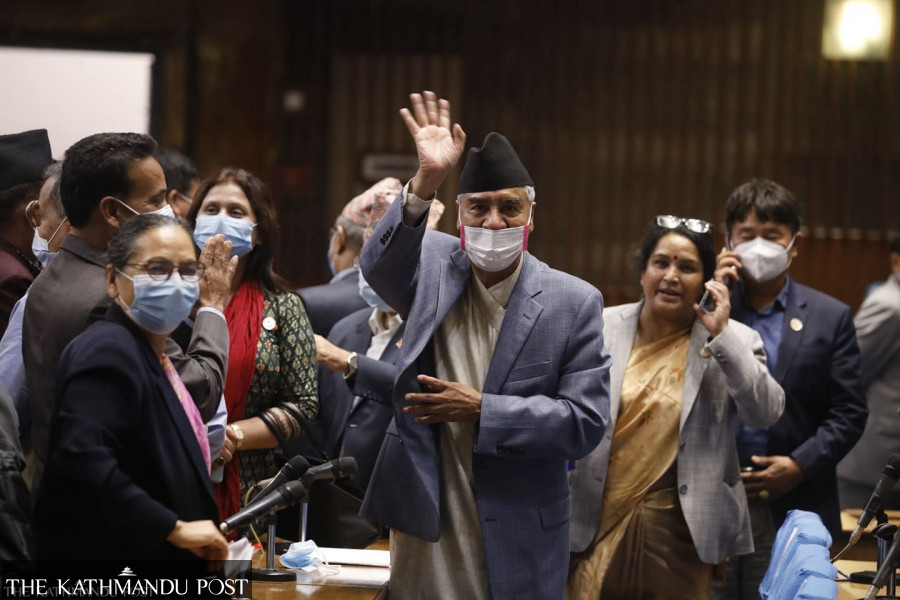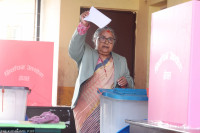Politics
Ruling, opposition parties on collision course after land commission scrapped
More of the Oli government’s decisions will be scrapped, Congress leaders say. Analysts argue that all decisions need not be overturned but there is no system in place.
Anil Giri
The Sher Bahadur Deuba government continues to overturn the decisions made by the erstwhile KP Sharma Oli government.
The latest in this series was the scrapping of the Land-related Problems Resolution Commission on Tuesday.
And there is more to come.
According to leaders of the ruling Nepali Congress party, one of the tasks assigned to the seven-member panel formed to come up with a common minimum programme and recommend names for government appointments, is also to suggest which of the hundreds of decisions the Oli government made should be scrapped.
“Once the government receives the report of the panel formed by the ruling parties, the government is going to cancel or scrap hundreds of decisions made by the previous government,” a leader of the Nepali Congress told the Post on condition of anonymity.
The panel led by Purna Bahadur Khadka, a general secretary of the Nepali Congress, has Minendra Rijal and Ramesh Lekhak from the Nepali Congress, Barsha Man Pun and Dev Gurung of the Communist Party of Nepal (Maoist Centre) and Rajendra Shrestha and Mahendera Raya Yadav of the Janata Samajbadi Party as members.
The government had on July 27, recalled the governors of Gandaki and Lumbini provinces and appointed Prithvi Man Gurung and Amik Shrechan in their places. Sherchan was earlier the governor of Gandaki province but he had been replaced by Oli in an attempt to save the chief ministerial position of Prithvi Subba Gurung, a close aide of his in the CPN-UML.
The government has also scrapped the 11 ambassadorial appointments made by the Oli government.
But the scrapping of the Land-related Problems Resolution Commission, headed by Devi Gyawali, has especially irked the CPN-UML. Gyawali, a leader from Chitwan, was narrowly defeated by Renu Dahal, daughter of Maoist Centre chair Pushpa Dahal in the Bharatpur Metropolitan City mayoral race. The Maoist Centre had aligned with the Nepali Congress during the 2017 local elections.
“Serious attention of the CPN-UML has been drawn to the government’s decision to dissolve the commission,” a statement issued by party spokesperson, Pradeep Gyawali, on Wednesday said. “The commission was formed as per the constitutional obligations including right to food (Article 36), right to housing (Article 37), rights of the Dalits (Article 40), and rights to social justice (Article 42).”
On Thursday, the Youth Association Nepal, a youth wing of the CPN-UML, started street protests demanding revocation of the decisions.
“The government played foul politics. It doesn’t want the continuation of good work,” Gyawali, the chief of the commission, told the Post. “It was wrong to dissolve the entire commission. If the Deuba-government disliked us it could have replaced us with a new team.”
The UML said that the government is prejudiced against the millions of landless people and has assaulted their rights and demanded that the government correct its decision.
With millions of landless in the country, distributing land to them is good political capital.
The Nepali Congress had opposed the formation of the commission when it was formed following the amendment to the Land Act in August 2019 saying that commission was formed to distribute land to party leaders and cadres in the name of landless people.
Even the faction opposed to Oli in the then Nepal Communist Party (NCP) had been against the commission with both Dahal and senior leader Madhav Kumar Nepal averse to the commission.
According to Min Bishwakarma, a Nepali Congress leader close to Prime Minister Deuba, the government was under pressure from other parties of the ruling alliance as well as the (Maoist Center) and UML faction led by Nepal to scrap the commission.
“The Nepal faction was not particularly happy with the decision to form the commission in the first place,” Bishwakarma told the Post. “The Gyawali-led commission was working unilaterally and supporting only local leaders and cadres of the Oli camp. The Maoist Centre also had reservations about it.”
Since its formation in last March, the commission had expanded to all 77 districts. It has signed agreements with 447 local units where 247,960 landless families and 922,801 informal settlers had already applied for land, according to the UML statement.
“The commission was dissolved because its very formation process was faulty and it was not following its objectives,” Gyanendra Bahadur Karki, government spokesperson and Minister of Law, Justice and Parliamentary Affairs said on Tuesday announcing the Cabinet decision.
Nepali Congress leaders said the new government has the prerogative of bringing new faces to help it govern the country.
“We know the UML will not be happy but the government wants to create a positive environment for smooth governance,” the Nepali Congress leader told the Post. “And if we continue to work with the same old faces appointed by Oli, how can the government perform well? Furthermore it is a universal practice to scrap appointments made by a previous government.”
Political analysts, however, say that rather than a blanket withdrawal of decisions of the previous government, decisions should be made on a case by case basis.
“Scrapping decisions and political appointments after the formation of the new government has become a culture in Nepali politics which is not good,” said political analyst Shyam Shrestha. “Only bad decisions should be scrapped.”
There are other ways too for the government to show its performance, he said.
“The government has the luxury to transfer bureaucrats and ambassadors so it can perform easily,” Shrestha told the Post.
Prime Minister Deuba, meanwhile, is yet to expand the Cabinet as there are only four ministers and one minister of state besides him that is running the government.
While Shrestha said the decision to scrap the land commission was a bad one, another political analyst Hari Roka welcomed the decision.
“The commission was formed to provide jobs for party leaders and cadres and no real land less people will join the protest against its scrapping,” said Rokka. “Protests against the scrapping within the UML are only by those who lost their jobs. There is a peasants’ association inside UML but it is silent.”
But Roka stressed that there is a need to address the problems of the landless.
“The ruling parties should come up with a proposal that is a clear alternative to the commission on how to address the issue of landless people, issue of food security and modernization of agriculture,” said Roka.
And as far as the UML opposition to the scrapping of the commission is concerned, Roka does not see any serious confrontation between the ruling and opposition parties as UML does not hold that moral grounds to confront the government in the issue over scrapping the land commission or any other decisions that the Deuba government takes.
“Oli needs an agenda to protest against the government and this time he is using the scrapping of the commission as one,” Roka told the Post.
That politicians use different issues as a matter of personal ego is a view that Shrestha shares.
“But such kind of ego in politics does not work,” said Shrestha. “This is not politics of values and morals. This only happens when there is no system or the system does not govern.”




 27.41°C Kathmandu
27.41°C Kathmandu













